人教版七年级下册期末复习课件 Unit1-Unit3(共32张PPT)
文档属性
| 名称 | 人教版七年级下册期末复习课件 Unit1-Unit3(共32张PPT) |  | |
| 格式 | pptx | ||
| 文件大小 | 13.4MB | ||
| 资源类型 | 教案 | ||
| 版本资源 | 人教新目标(Go for it)版 | ||
| 科目 | 英语 | ||
| 更新时间 | 2024-06-09 22:14:07 | ||
图片预览



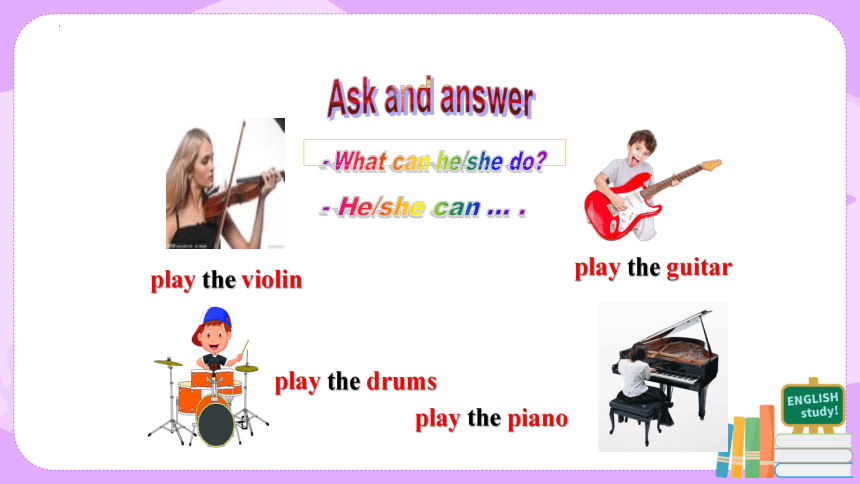
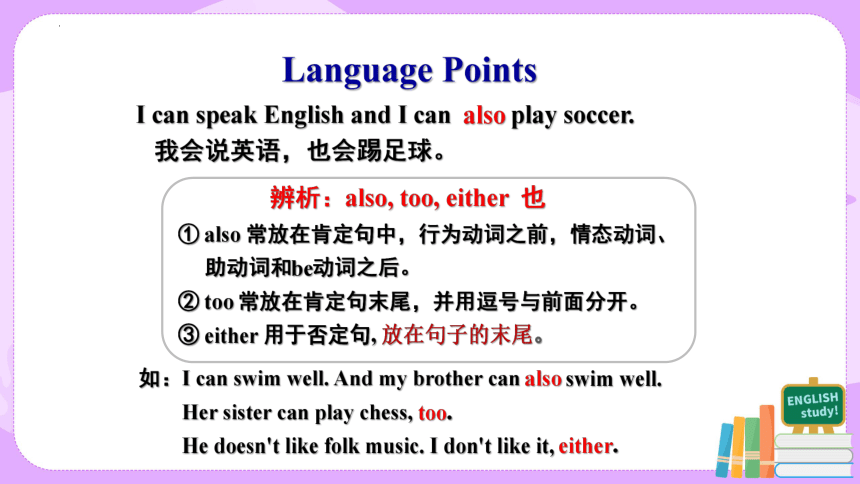
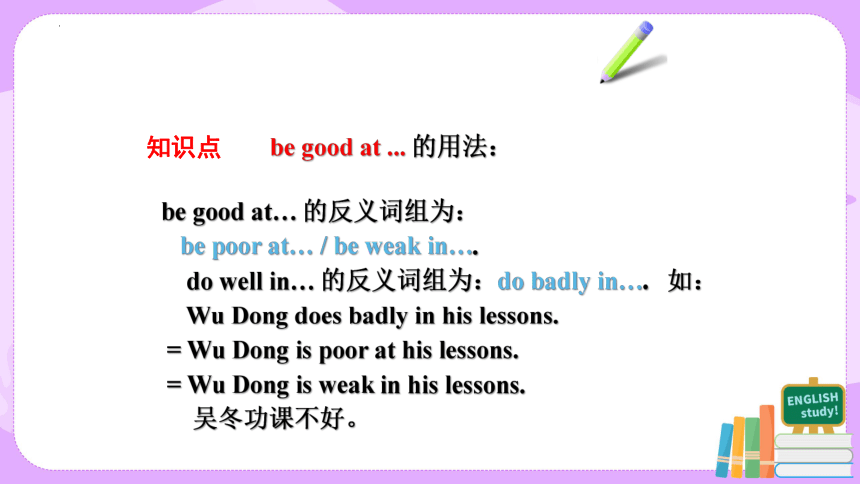
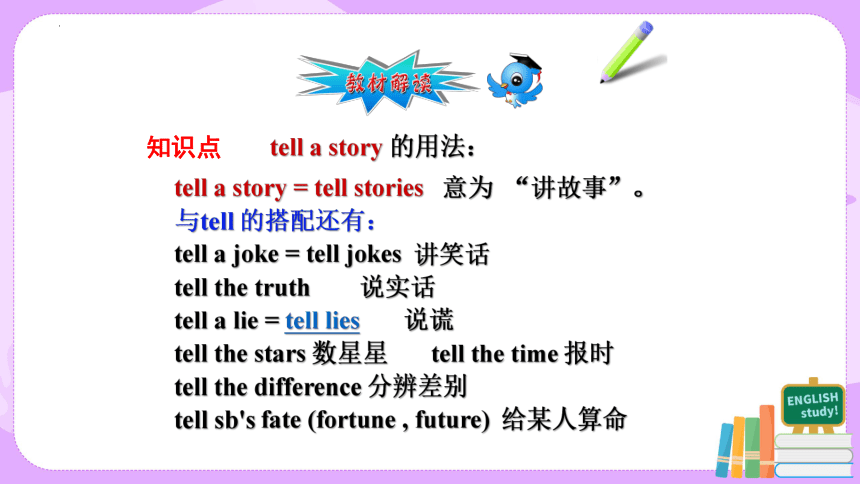
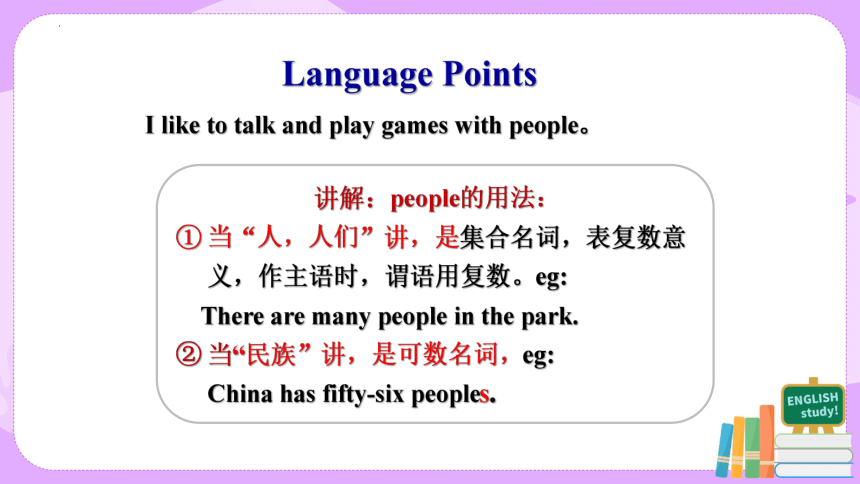
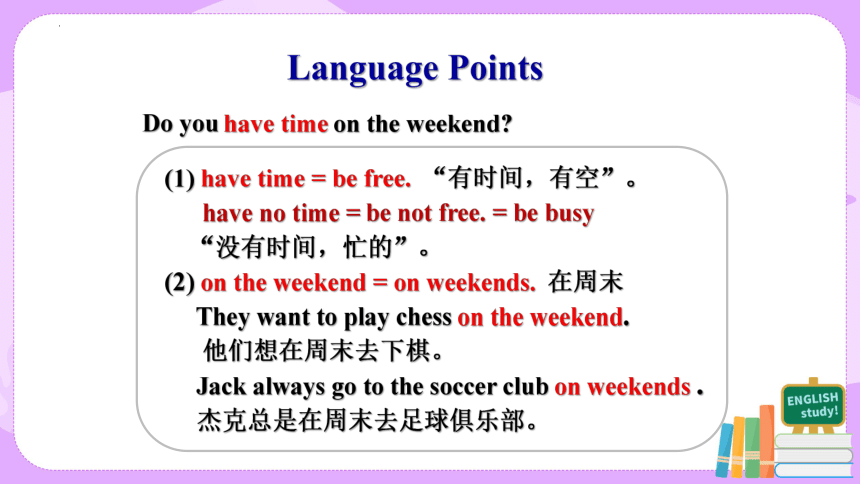
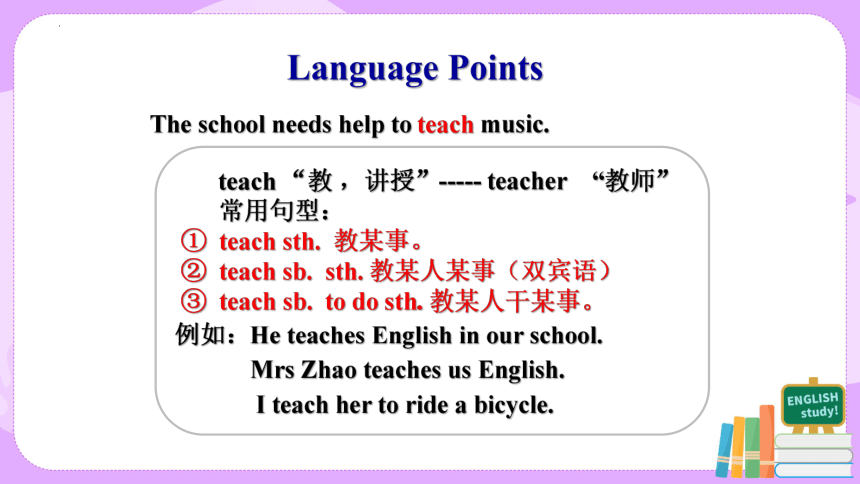
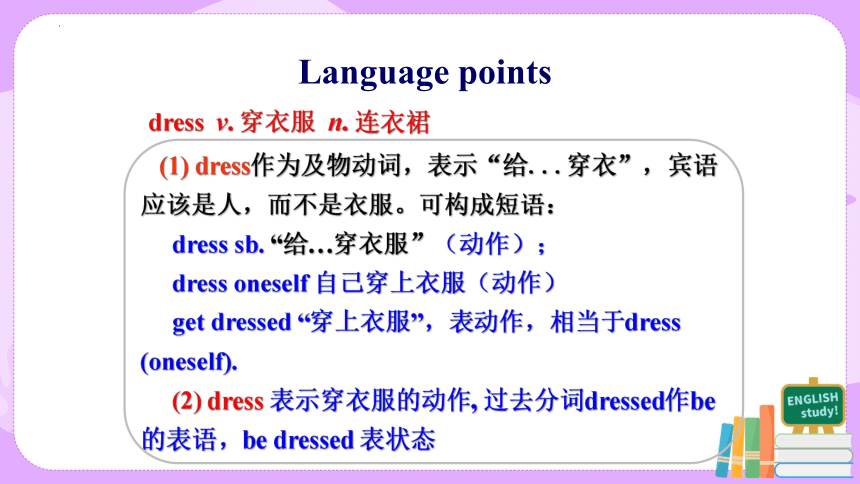
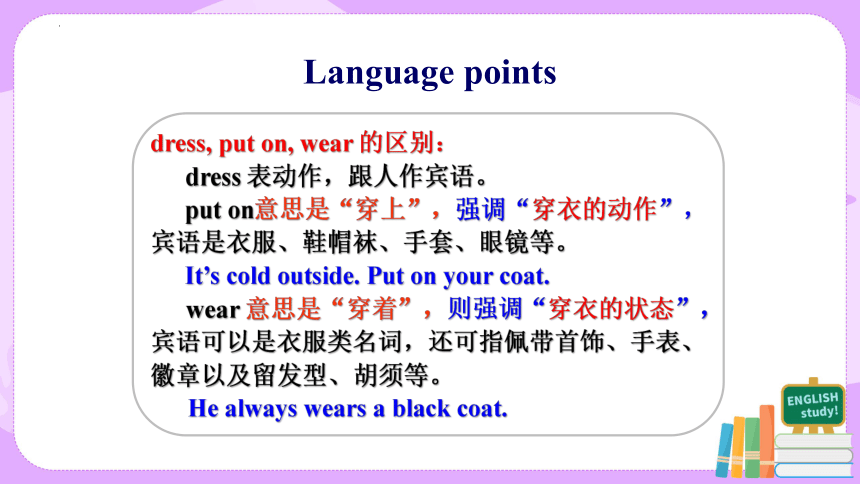
文档简介
(共32张PPT)
期末复习
七下人教版
U1-U3
知识梳理
2
What kind of instrument is it
guitar
violin
drums
piano
1
3
4
Listen and guess
- What can he/she do
play the violin
play the guitar
play the piano
play the drums
- He/she can ... .
Ask and answer
I can speak English and I can also play soccer.
我会说英语,也会踢足球。
① also 常放在肯定句中,行为动词之前,情态动词、
助动词和be动词之后。
② too 常放在肯定句末尾,并用逗号与前面分开。
③ either 用于否定句, 放在句子的末尾。
辨析:also, too, either 也
如:I can swim well. And my brother can also swim well.
Her sister can play chess, too.
He doesn't like folk music. I don't like it, either.
Language Points
be good at… 的反义词组为:
be poor at… / be weak in….
do well in… 的反义词组为:do badly in…. 如:
Wu Dong does badly in his lessons.
= Wu Dong is poor at his lessons.
= Wu Dong is weak in his lessons.
吴冬功课不好。
知识点
be good at ... 的用法:
知识点
tell a story 的用法:
tell a story = tell stories 意为 “讲故事”。
与tell 的搭配还有:
tell a joke = tell jokes 讲笑话
tell the truth 说实话
tell a lie = tell lies 说谎
tell the stars 数星星 tell the time 报时
tell the difference 分辨差别
tell sb's fate (fortune , future) 给某人算命
讲解:people的用法:
① 当“人,人们”讲,是集合名词,表复数意
义,作主语时,谓语用复数。eg:
There are many people in the park.
② 当“民族”讲,是可数名词,eg:
China has fifty-six peoples.
I like to talk and play games with people。
Language Points
(1) have time = be free. “有时间,有空”。
have no time = be not free. = be busy
“没有时间,忙的”。
(2) on the weekend = on weekends. 在周末
They want to play chess on the weekend.
他们想在周末去下棋。
Jack always go to the soccer club on weekends .
杰克总是在周末去足球俱乐部。
Do you have time on the weekend
Language Points
teach “教 ,讲授”----- teacher “教师”
常用句型:
① teach sth. 教某事。
② teach sb. sth. 教某人某事(双宾语)
③ teach sb. to do sth. 教某人干某事。
例如:He teaches English in our school.
Mrs Zhao teaches us English.
I teach her to ride a bicycle.
The school needs help to teach music.
Language Points
(1) dress作为及物动词,表示“给...穿衣”,宾语应该是人,而不是衣服。可构成短语:
dress sb. “给…穿衣服”(动作);
dress oneself 自己穿上衣服(动作)
get dressed “穿上衣服”,表动作,相当于dress (oneself).
(2) dress 表示穿衣服的动作, 过去分词dressed作be的表语,be dressed 表状态
Language points
dress v. 穿衣服 n. 连衣裙
dress, put on, wear 的区别:
dress 表动作,跟人作宾语。
put on意思是“穿上”,强调“穿衣的动作”,宾语是衣服、鞋帽袜、手套、眼镜等。
It’s cold outside. Put on your coat.
wear 意思是“穿着”,则强调“穿衣的状态”,宾语可以是衣服类名词,还可指佩带首饰、手表、徽章以及留发型、胡须等。
He always wears a black coat.
Language points
exercise 的用法小结
作动词,意为“锻炼”。如:
他爷爷每天早晨锻炼。
His grandpa _________ in the morning.
作不可数名词,意为“锻炼;运动”,如:
每天他都做大约十五分钟的运动。
He does about fifteen minutes’ ________ every day.
作可数名词,意为“体操, 练习”。
我们每天做早/眼操。
We do morning /eye ________ every day.
exercises
exercise
exercises
Language points
taste 尝起来
smell 闻起来
feel 摸起来
look 看起来
sound 听起来
+ adj.
taste good
eat/sell well
系表结构 (作谓语)
That sounds fun.
It looks nice.
This fish smells bad.
This sofa feels nice and soft.
比较:
Language points
拓展:
taste作名词,意为“味道”。
The ice-cream has a taste of lemon.
In the evening, she does her homework and usually swims or takes a walk.
1)and/or/but 连接两个平行的(动)词
Come and have a look.
She likes singing and dancing.
He likes football and plays it every day.
Tom doesn’t sing or dance.
Lily __________(not do) homework but _______
(watch) TV on weekends.
2)walk n. & v.
have/take a walk
go for a walk
doesn’t do
watches
Language points
交通方式的询问及表达
1. 对交通方式提问用how。
2. 交通方式的表达
(1) take + 限定词 + 交通工具名称
(2) by + 交通工具名称
(3) in/on + 限定词 + 交通工具名称
(4) ride + 限定词 + 交通工具名称, 意为“骑……”
(5) on foot 意为“步行”, “步行去某地”还可以表达为walk
to. . .
take + 限定词 (a /an / the / my / his)+交通工具(单数),= take+交通工具(复数),表示“乘坐 …….”。
eg:He takes the bus to school.
He takes buses to school.
2. By + 交通工具 “乘坐 ......”
eg: He goes to school by bus.
by bus, by car, by air/by plane, by ship/by sea
注意:He goes to school by a bus. (×)
He goes to school by buses. (×)
take the car = take cars
区别:take the bus 是动词短语,by bus 是介词短语.
转换:take the bus to +地点=go to +地点+ by bus
练习:同义句转化
Tom takes the car to go home.
Mary rides the bike to school.
注意:She walks to school.
= She goes to school on foot.
Tom goes home by car.
Mary goes to school by bike.
The road runs north. 这条路伸向北方.
“run”表示 “延伸”
“run”可以做名词 “奔跑,路程”
Let's go for a run across the field.
咱们去跑步,跑过那片田野吧。
It is an hour's run by train from here to London.
从此地到伦敦搭火车有一小时的行程。
Lanauage points
But he is not afraid. 但是他不害怕。
afraid adj. “害怕的;畏惧的”;在句子中只能作表语。 常见句型有:
(1)be afraid “ …… 害怕的”
The girl is very afraid. 小女孩很害怕。
(2)be afraid of … “害怕 ……”
My sister is afraid of snakes. 我妹妹害怕蛇。
(3)be afraid to do sth. “害怕(不敢)做某事”
I’m afraid to speak in front of other people.
(4)be afraid of +v -ing “怕(担心)做某事”
I am afraid of falling into water.
Lanauage points
He’s like a father to me. 他像父亲一样对待我。
like 在这里作介词,而不是动词。意思是“像…”。
The fish looks like a big boat. (介词)
Jane likes history very much. (动词)
to sb. “对......来说”
Lanauage points
My teacher is like a mother to me.
我的老师对我就像妈妈一样
我的父母对我就像朋友一样
My parents ____ ____my friends __ ___.
to me
are like
Many of the students and villagers never leave the village. 许多学生和村民从未离开过村庄。
leave v. 离开
Please turn off the light when you leave.
leave for + 地点(目的地)表示 “动身去某地”
He will leave for Shanghai tomorrow.
leave + 地点(出发地)+ for + 地点(目的地)
表示“离开某地去某地”
I will leave Beijing for Shanghai .
Lanauage points
模拟练习
02
冰淇淋尝起来很好,但对她的健康不好
Ice-cream ____ _____, but it’s not _____ __ her.
在晚上,我通常游泳或散步。
In the _______, I usually _____or __________.
他有时候会打半个小时的篮球。
He _________ plays basketball __ ____ an hour.
evening
swim
talk a walk
sometimes
for half
tastes good
good
for
根据汉语提示完成句子:
Exercises
1. I can speak English and I can also play soccer.
【原句翻译__________________________________
【仿写造句】 can..., can also...
___________________________________________
2. Are you good with old people
【原句翻译 】______________________________
【仿写造句】 be good with
__________________________________________
3. They can tell you stories, and you can make friends.
【原句翻译】_________________________________
【仿写造句】make friends
__________________________________________
我会说英语并且我也会踢足球。
你善于和老人相处吗?
他们能给你讲故事,你们可以交朋友。
Exercise
课堂检测
1. Gina __ _____ ____ (善于应付……的) her friends.
2. 请给张先生打电话598-6668.
Please ____ Mr. Zhang ___ 598-6668.
3. I often help my brother with his math. (改为一般疑问句)
Do _____ often help _____ brother with his math
is good with
call at
you your
Exercise
课堂检测
4. He does well in playing guitar. (改为同义句)
He is _____ ____ playing guitar.
5. My father teaches English in a middle school. (改为否定句)
My father _______ _______ English in a middle school.
good at
doesn’t teach
4. A: When does Eric ____ _ ____
B: He usually _____ a walk at a
_______ __ __ in the _______.
3. A: When does Jim ________________
B: He usually ____ his _________ at
__ ______ __ eight in the _______.
do his homework
does
a quarter to
take a
takes
quarter to six
7:45 PM
5:45 PM
evening
evening
homework
walk
看图补全对话
Exercises
1. 我早上5点起床。
I ___ ___ at 5 in the _________.
2. Mary 晚上7点做作业。
Mary ___ __________ at 7 in the________.
3. 你什么时候回家? When do you ___ _____
4. 我下午6点回家。
I ___ _____ at 6 in the __________.
5. Tony什么时候睡觉 。
When ____ Tony ___ ___ ___
6. 他晚上9点睡觉。
He ____ __ ___ at 9 in the evening.
完成句子:
get up
morning
does homework
evening
go home
go home
afternoon
does
go to bed
goes to bed
Exercises
Exercises
一、翻译短语
1. 火车站 __________ 2. 地铁站 ____________ 3. 公共汽车站 __________
4.认为;想起 ________ 5. 乘地铁 ____________ 6. 到校 ____________
7.多远 _________ 8.多长时间 _________ 9.到他祖父母的家 _____________
10. 坐火车 __________ 11.到达那儿 __________ 12.去那儿 __________
二、完成对话
1. 他认为这次旅行怎么样?
______ does he ______ ______ the trip
2. 到他祖父母家花费多长时间?
______ ______ does it take ______ ______to his grandparents' home
train station
subway station
bus station
take the subway
get to school
how far
How long
get his grandparents’ home
take the train
get there
go there
what
think
of
How
long
to
get
think of
三、句型转换
1. They ride their bikes to school. (就画线部分提问)
2. It takes 50 minutes to get here. (就画线部分提问)
3. It takes only 10 minutes to take the bus. (改为同义句)
4. It takes about 40 minutes on foot. (同义句)
_____ _____ _____ get to school
It takes only 10 minutes _____ ____.
It takes about 40 minutes ____ _____.
_____ ______ _____ it take to get here
How
do
they
long
does
by
bus
to
walk
How
( )1. My school isn't far _______ my home.
A.to B.from C.for D.in
( )2. — _______ does it take Jim to get to school?
— About eleven minutes.
A.How much B. How far C.How long D. How
( )3. — _______ is it from here to his school?
— Fifty meters.
A. How long B. How many
C. How much D. How far
( ) 4. — _______ can you get there?
— By bike.
A. What B. Where C. How D. Why
( )5. Students usually _______ the subway to school.
A. ride B. take C. by D. Walk
B
C
D
C
B
thanks
期末复习
七下人教版
U1-U3
知识梳理
2
What kind of instrument is it
guitar
violin
drums
piano
1
3
4
Listen and guess
- What can he/she do
play the violin
play the guitar
play the piano
play the drums
- He/she can ... .
Ask and answer
I can speak English and I can also play soccer.
我会说英语,也会踢足球。
① also 常放在肯定句中,行为动词之前,情态动词、
助动词和be动词之后。
② too 常放在肯定句末尾,并用逗号与前面分开。
③ either 用于否定句, 放在句子的末尾。
辨析:also, too, either 也
如:I can swim well. And my brother can also swim well.
Her sister can play chess, too.
He doesn't like folk music. I don't like it, either.
Language Points
be good at… 的反义词组为:
be poor at… / be weak in….
do well in… 的反义词组为:do badly in…. 如:
Wu Dong does badly in his lessons.
= Wu Dong is poor at his lessons.
= Wu Dong is weak in his lessons.
吴冬功课不好。
知识点
be good at ... 的用法:
知识点
tell a story 的用法:
tell a story = tell stories 意为 “讲故事”。
与tell 的搭配还有:
tell a joke = tell jokes 讲笑话
tell the truth 说实话
tell a lie = tell lies 说谎
tell the stars 数星星 tell the time 报时
tell the difference 分辨差别
tell sb's fate (fortune , future) 给某人算命
讲解:people的用法:
① 当“人,人们”讲,是集合名词,表复数意
义,作主语时,谓语用复数。eg:
There are many people in the park.
② 当“民族”讲,是可数名词,eg:
China has fifty-six peoples.
I like to talk and play games with people。
Language Points
(1) have time = be free. “有时间,有空”。
have no time = be not free. = be busy
“没有时间,忙的”。
(2) on the weekend = on weekends. 在周末
They want to play chess on the weekend.
他们想在周末去下棋。
Jack always go to the soccer club on weekends .
杰克总是在周末去足球俱乐部。
Do you have time on the weekend
Language Points
teach “教 ,讲授”----- teacher “教师”
常用句型:
① teach sth. 教某事。
② teach sb. sth. 教某人某事(双宾语)
③ teach sb. to do sth. 教某人干某事。
例如:He teaches English in our school.
Mrs Zhao teaches us English.
I teach her to ride a bicycle.
The school needs help to teach music.
Language Points
(1) dress作为及物动词,表示“给...穿衣”,宾语应该是人,而不是衣服。可构成短语:
dress sb. “给…穿衣服”(动作);
dress oneself 自己穿上衣服(动作)
get dressed “穿上衣服”,表动作,相当于dress (oneself).
(2) dress 表示穿衣服的动作, 过去分词dressed作be的表语,be dressed 表状态
Language points
dress v. 穿衣服 n. 连衣裙
dress, put on, wear 的区别:
dress 表动作,跟人作宾语。
put on意思是“穿上”,强调“穿衣的动作”,宾语是衣服、鞋帽袜、手套、眼镜等。
It’s cold outside. Put on your coat.
wear 意思是“穿着”,则强调“穿衣的状态”,宾语可以是衣服类名词,还可指佩带首饰、手表、徽章以及留发型、胡须等。
He always wears a black coat.
Language points
exercise 的用法小结
作动词,意为“锻炼”。如:
他爷爷每天早晨锻炼。
His grandpa _________ in the morning.
作不可数名词,意为“锻炼;运动”,如:
每天他都做大约十五分钟的运动。
He does about fifteen minutes’ ________ every day.
作可数名词,意为“体操, 练习”。
我们每天做早/眼操。
We do morning /eye ________ every day.
exercises
exercise
exercises
Language points
taste 尝起来
smell 闻起来
feel 摸起来
look 看起来
sound 听起来
+ adj.
taste good
eat/sell well
系表结构 (作谓语)
That sounds fun.
It looks nice.
This fish smells bad.
This sofa feels nice and soft.
比较:
Language points
拓展:
taste作名词,意为“味道”。
The ice-cream has a taste of lemon.
In the evening, she does her homework and usually swims or takes a walk.
1)and/or/but 连接两个平行的(动)词
Come and have a look.
She likes singing and dancing.
He likes football and plays it every day.
Tom doesn’t sing or dance.
Lily __________(not do) homework but _______
(watch) TV on weekends.
2)walk n. & v.
have/take a walk
go for a walk
doesn’t do
watches
Language points
交通方式的询问及表达
1. 对交通方式提问用how。
2. 交通方式的表达
(1) take + 限定词 + 交通工具名称
(2) by + 交通工具名称
(3) in/on + 限定词 + 交通工具名称
(4) ride + 限定词 + 交通工具名称, 意为“骑……”
(5) on foot 意为“步行”, “步行去某地”还可以表达为walk
to. . .
take + 限定词 (a /an / the / my / his)+交通工具(单数),= take+交通工具(复数),表示“乘坐 …….”。
eg:He takes the bus to school.
He takes buses to school.
2. By + 交通工具 “乘坐 ......”
eg: He goes to school by bus.
by bus, by car, by air/by plane, by ship/by sea
注意:He goes to school by a bus. (×)
He goes to school by buses. (×)
take the car = take cars
区别:take the bus 是动词短语,by bus 是介词短语.
转换:take the bus to +地点=go to +地点+ by bus
练习:同义句转化
Tom takes the car to go home.
Mary rides the bike to school.
注意:She walks to school.
= She goes to school on foot.
Tom goes home by car.
Mary goes to school by bike.
The road runs north. 这条路伸向北方.
“run”表示 “延伸”
“run”可以做名词 “奔跑,路程”
Let's go for a run across the field.
咱们去跑步,跑过那片田野吧。
It is an hour's run by train from here to London.
从此地到伦敦搭火车有一小时的行程。
Lanauage points
But he is not afraid. 但是他不害怕。
afraid adj. “害怕的;畏惧的”;在句子中只能作表语。 常见句型有:
(1)be afraid “ …… 害怕的”
The girl is very afraid. 小女孩很害怕。
(2)be afraid of … “害怕 ……”
My sister is afraid of snakes. 我妹妹害怕蛇。
(3)be afraid to do sth. “害怕(不敢)做某事”
I’m afraid to speak in front of other people.
(4)be afraid of +v -ing “怕(担心)做某事”
I am afraid of falling into water.
Lanauage points
He’s like a father to me. 他像父亲一样对待我。
like 在这里作介词,而不是动词。意思是“像…”。
The fish looks like a big boat. (介词)
Jane likes history very much. (动词)
to sb. “对......来说”
Lanauage points
My teacher is like a mother to me.
我的老师对我就像妈妈一样
我的父母对我就像朋友一样
My parents ____ ____my friends __ ___.
to me
are like
Many of the students and villagers never leave the village. 许多学生和村民从未离开过村庄。
leave v. 离开
Please turn off the light when you leave.
leave for + 地点(目的地)表示 “动身去某地”
He will leave for Shanghai tomorrow.
leave + 地点(出发地)+ for + 地点(目的地)
表示“离开某地去某地”
I will leave Beijing for Shanghai .
Lanauage points
模拟练习
02
冰淇淋尝起来很好,但对她的健康不好
Ice-cream ____ _____, but it’s not _____ __ her.
在晚上,我通常游泳或散步。
In the _______, I usually _____or __________.
他有时候会打半个小时的篮球。
He _________ plays basketball __ ____ an hour.
evening
swim
talk a walk
sometimes
for half
tastes good
good
for
根据汉语提示完成句子:
Exercises
1. I can speak English and I can also play soccer.
【原句翻译__________________________________
【仿写造句】 can..., can also...
___________________________________________
2. Are you good with old people
【原句翻译 】______________________________
【仿写造句】 be good with
__________________________________________
3. They can tell you stories, and you can make friends.
【原句翻译】_________________________________
【仿写造句】make friends
__________________________________________
我会说英语并且我也会踢足球。
你善于和老人相处吗?
他们能给你讲故事,你们可以交朋友。
Exercise
课堂检测
1. Gina __ _____ ____ (善于应付……的) her friends.
2. 请给张先生打电话598-6668.
Please ____ Mr. Zhang ___ 598-6668.
3. I often help my brother with his math. (改为一般疑问句)
Do _____ often help _____ brother with his math
is good with
call at
you your
Exercise
课堂检测
4. He does well in playing guitar. (改为同义句)
He is _____ ____ playing guitar.
5. My father teaches English in a middle school. (改为否定句)
My father _______ _______ English in a middle school.
good at
doesn’t teach
4. A: When does Eric ____ _ ____
B: He usually _____ a walk at a
_______ __ __ in the _______.
3. A: When does Jim ________________
B: He usually ____ his _________ at
__ ______ __ eight in the _______.
do his homework
does
a quarter to
take a
takes
quarter to six
7:45 PM
5:45 PM
evening
evening
homework
walk
看图补全对话
Exercises
1. 我早上5点起床。
I ___ ___ at 5 in the _________.
2. Mary 晚上7点做作业。
Mary ___ __________ at 7 in the________.
3. 你什么时候回家? When do you ___ _____
4. 我下午6点回家。
I ___ _____ at 6 in the __________.
5. Tony什么时候睡觉 。
When ____ Tony ___ ___ ___
6. 他晚上9点睡觉。
He ____ __ ___ at 9 in the evening.
完成句子:
get up
morning
does homework
evening
go home
go home
afternoon
does
go to bed
goes to bed
Exercises
Exercises
一、翻译短语
1. 火车站 __________ 2. 地铁站 ____________ 3. 公共汽车站 __________
4.认为;想起 ________ 5. 乘地铁 ____________ 6. 到校 ____________
7.多远 _________ 8.多长时间 _________ 9.到他祖父母的家 _____________
10. 坐火车 __________ 11.到达那儿 __________ 12.去那儿 __________
二、完成对话
1. 他认为这次旅行怎么样?
______ does he ______ ______ the trip
2. 到他祖父母家花费多长时间?
______ ______ does it take ______ ______to his grandparents' home
train station
subway station
bus station
take the subway
get to school
how far
How long
get his grandparents’ home
take the train
get there
go there
what
think
of
How
long
to
get
think of
三、句型转换
1. They ride their bikes to school. (就画线部分提问)
2. It takes 50 minutes to get here. (就画线部分提问)
3. It takes only 10 minutes to take the bus. (改为同义句)
4. It takes about 40 minutes on foot. (同义句)
_____ _____ _____ get to school
It takes only 10 minutes _____ ____.
It takes about 40 minutes ____ _____.
_____ ______ _____ it take to get here
How
do
they
long
does
by
bus
to
walk
How
( )1. My school isn't far _______ my home.
A.to B.from C.for D.in
( )2. — _______ does it take Jim to get to school?
— About eleven minutes.
A.How much B. How far C.How long D. How
( )3. — _______ is it from here to his school?
— Fifty meters.
A. How long B. How many
C. How much D. How far
( ) 4. — _______ can you get there?
— By bike.
A. What B. Where C. How D. Why
( )5. Students usually _______ the subway to school.
A. ride B. take C. by D. Walk
B
C
D
C
B
thanks
同课章节目录
